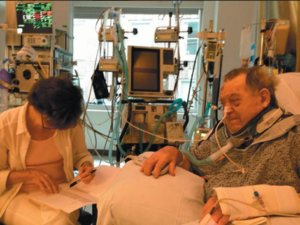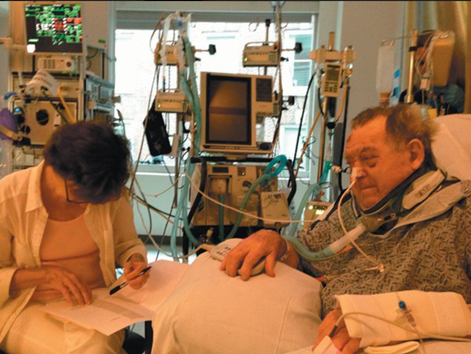Hi, it’s Patrik Hutzel from INTENSIVECAREHOTLINE.COM where we instantly improve the lives for Families of critically ill Patients in Intensive Care, so that you can make informed decisions, have PEACE OF MIND, real power, real control and so that you can influence decision making fast, even if you’re not a doctor or a nurse in Intensive Care!
This is another episode of “YOUR QUESTIONS ANSWERED“ and in last week’s episode I answered another question from our readers and the
question was
My Husband’s in ICU in an Induced Coma on
Midazolam, He’s Not Waking Up, Should He Have Propofol?
You can check out last week’s question by clicking on the link here.
In this week’s episode of “YOUR QUESTIONS ANSWERED” I want to answer questions from one of my clients Joy, as part of my 1:1 consulting and advocacy. Joy’s dad is in ICU ventilated with tracheostomy and she is asking how will they know if her dad is ready to come off the ventilator in ICU.
How Do We Know If Our Dad is Ready to Come off the Ventilator in ICU?

“You can also check out previous 1:1 consulting and advocacy sessions with me and Joy here.”
Part 1
Part 2
Part 3
Joy: Right. They didn’t have any LTACs that were
directly associated to-
Patrik: Related. Associated, yeah. Yeah. Okay.
Joy: Or related.
Patrik: Yeah, yeah, yeah. It’s not the same group. Okay. Look, you should definitely have a look at the couple of them and have a look at online reviews.
Joy: Yeah.
Okay.
Patrik: Online reviews, generally speaking, for LTACs are not great.
Joy: Yeah.
Rey: Right.
Joy: That’s what we found.
Patrik: But don’t let them pressure you, in terms of this is your decision, and, as I said, the next step for them might be they will be telling you all about money, and they will be telling you, “Oh yeah, but he’s running out of entitlements.” If you don’t hear from the insurance directly, I wouldn’t worry too much about it.
Rey: Okay.
Joy: Great.
Rey: Another thing,
Patrik, regarding these supplements and things, generally, if I’m just talking about a dietary supplement, like the vitamin D or the vitamin C, they shouldn’t have any problem including that in the regimen, as long as there’s no interference with any of the other medications, right?
Patrik: I would say yes. I am not
a dietician. I don’t know what rules and regulations a dietician works under, but there’s a lot of clients that are telling me similar things about nutrition, and generally speaking, it shouldn’t be a big deal as long as, like you said, as long as it doesn’t interfere with other treatments, and at the end of the day, it’s nutrition.
Rey: Yes. Okay. These are things that he’s had before. I mean, there may be some other nutrients that I might try to get them to use as well.
RECOMMENDED:
Joy: I want to ask, Patrik, I guess this is something that just in terms of where we see our dad, if we are able to have him get off of the ventilator and get possibly to another facility outside of the hospital and get some rehab, I’m thinking that the next step, I know ultimately, he wants to come home.
Patrik: Yeah. Look, nobody wants to be in a hospital, and you want your family at home, of course. But can he come home on a ventilator? Can he come home if he’s off the ventilator and he only have the trach? Difficult but not impossible, but very difficult. So to give you some insights there, we are running a company here in Melbourne, Australia, Intensive Care at Home. We are taking patients home from
ICU with ventilation and tracheostomy. We do that. That’s bread and butter for us.
Highly specialized skill, huge demand, not enough staff to serve the market, right? We have so many inquiries for Intensive Care at Home from the US. It’s unbelievable. And we are trying to help people. There are just no services out there.
Joy: Okay.
Patrik: I believe your dad’s next steps are… It sounds to me like he’s halfway there of getting off the ventilator. Once he’s off the ventilator, he will need to have the trach removed as a next step. Is this possible? I don’t know at the moment, simply because I don’t know whether they can build up your
dad’s strength. Just because he has most likely the capacity to come off the ventilator, it doesn’t mean that he has the capacity to have the trach removed because he needs to be able to swallow. He needs to be able to cough to protect his own airway, and if neither of that can be met, he might need the trach for long periods to come.
Suggested Links:
Rey: How do they make that determination that he’s ready to come off the ventilator, then?
Patrik: Yeah, fairly simple. If he can breathe without the ventilator, he’s not getting exhausted, his oxygen levels are fine, that’s sort of the gauge for it. Potentially also a last arterial blood gas, but you can pretty quickly see. If they’re putting your dad back on the ventilator after 12 hours, let’s say, it’s probably because he’s exhausted. And if he doesn’t get exhausted, well, let’s just keep him off the ventilator.
Rey: Okay.
Joy: Yeah.
Patrik: So you are stuck between a rock and heart place at the moment. You should definitely see whether there is someone that can help you with setting up home care. But as I said, I’m talking to people every day in similar situations than you are in, and we’ve done our research. We are trying to help people with home care. There’s just nothing out there for someone on a ventilator with a trach.
Rey: Okay.
Joy: Okay.
Patrik: And keep in mind, going home after such a chronic illness is difficult enough without a ventilator, let alone with a ventilator. You need to know what you’re doing. If you do that, you need to have the staff, you need to have some experience to set it up.
Joy: Oh, yeah. Okay.
Patrick: I wish I had a quick fix for you. There’s no quick fix. You need patience and persistence and be prepared for sort of two steps forward, one step back.
Rey: Yeah. If we would’ve known before what we know now, we could’ve probably avoided all of
this.
Patrik: Maybe not avoid, but at least put it in the right direction. A lot of what’s happening with trachs, in particular, is a lot of ICUs want to do tracheostomies because they know there’s the LTAC on the other end, and they’re often no longer putting in the effort of weaning someone off the ventilator in the
first place, the path of least resistance. It’s very sad. And COVID certainly made the situation
gone worse.
Rey: Yeah. I think that we were maneuvered into this. At first, they said they were going to put the tube in without the trach and put it in there for two weeks and then see how that goes, and then all of a sudden, it’s like the next day, no, get the trach, he’s going to be a lot more
comfortable.
Patrik: Yeah, sure. Surely, a trach is more comfortable than a breathing tube, but it’s also, what if you can avoid it? What if you can wean someone off a ventilator? Why would you do a surgery and-
Rey: Right. Exactly. Yep. Okay.
Recommended:
Joy: Okay.
Rey: Well, thank you very much.
Joy: Thank you.
Patrik: It’s a pleasure. Did you have any other questions?
Rey: None that come to mind at this time. No. Would you spell LTAC? I spelled it L-T-A-C-K. But how do you spell it?
Patrik: L-T-A-C. Long Term Acute Care.
Rey: Okay.
Patrik: And the terms LTAC and subacute are sort of interchangeable, but at the end of the day,
it’s the same. I’ll tell you what I think it is, from my experience, it’s the better version of a nursing home.
Rey: Yeah. I kind of got that from the way they were describing it. Yeah.
Joy: A better version, you’re saying?
Patrik: A better version of a nursing home, but picture this, how can you go from ICU to a nursing home?
Joy: Right.
Rey: Yeah.
Rey:
Yeah. Okay.
Joy: Right. Thank you very much.
Patrik: It’s a pleasure. Send me a picture of the ventilator, because then I can really tell you how
realistic is it for him to get off that ventilator.
Rey: Okay. Joy, you got that?
Patrik: And send me a picture off the monitor, because then I can
see whether they’re still doing blood gases or not.
Joy: Okay. I’ll just take a picture of that.
Patrik: Yeah, that would be great.
Joy: Okay. Yeah. All right. Thank you, Patrik.
Rey: Patrik, at this point, do you think it’s necessary that we should start looking for lawyers?
Patrik: No. I don’t think it’s necessary yet. If I was you, I would approach everything in there, irrespective of what they’re saying, as everything in life is negotiable. That’s how I would approach it. Approach it with the assumption… Well, no, that’s actually not an assumption, it’s a reality, that everything in a hospital has a policy attached to it. Whether it’s, again, simple things like cleaning a window, also
including a discharge to another hospital. There is a policy for that, and in that policy, I argue that either the patient or the next of kin or the power of attorney needs to give consent.
Rey: Okay.
Joy: Okay.
Patrik: Right? So is there a time and a place for a lawyer? Yes, but I don’t think it’s there yet. Of course, I am not a lawyer, I’m a clinician. Would you say that overall, they are cooperative with you so far, that
overall?
Rey: I think so. Relatively cooperative. I think so.
RECOMMENDED:
Patrik: Let’s keep it like that. Make friends while you can. Make friends while you can.
There is a time and a place for a lawyer, but what you’re sharing with me, I don’t think that’s needed at the moment.
Joy: Okay.
Rey: All right. Okay. Thank you.
Patrik: It’s a pleasure.
Rey: It’s a pleasure. Yeah. Thank
you. Thank you very much.
Patrik: It’s a pleasure. I hope it’s going well for your dad and for you.
Joy: Thank you.
Rey: Yeah. Well, everything’s going to work out.
Patrik: Absolutely. Yes.
Joy: Thank you.
Patrik: Let me know how it goes. Thank you.
Joy: Okay. Thank you. We’ll stay in touch.
Patrik: Take care.
Joy: Thank you,
Patrik.
Patrik: Thank you. Bye.
The 1:1 consulting session will continue in next week’s episode.
Kind regards,
Patrik
The 1:1 consulting session will continue in next week’s episode.
PS
I only have one consulting spot left for the rest of the week, if you want
it, hit reply to this email and say "I'm in" and I'll send you all the details.
phone 415- 915-0090 in the
USA/Canada
phone 03- 8658 2138 in Australia/ New Zealand
phone 0118 324 3018 in the UK/Ireland
Skype patrik.hutzel
If you have a question you need
answered, just hit reply to this email or send it to me at support@intensivecarehotline.com
Or if you want to be featured on our PODCAST with your story, just email me at support@intensivecarehotline.com
phone 415-915-0090 in the USA/Canada 

phone 03 8658 2138 in Australia/ New Zealand 
phone 0118 324 3018 in the UK/ Ireland 

Phone now on Skype at patrik.hutzel
Patrik Hutzel
Critical Care Nurse
Counsellor and Consultant for families in Intensive Care
WWW.INTENSIVECAREHOTLINE.COM






